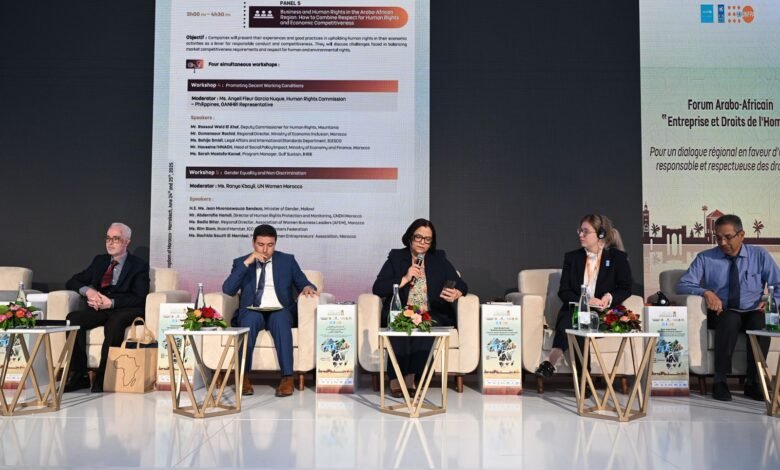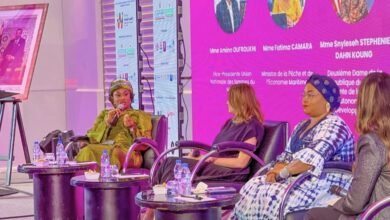Justice in the Green Transition: Advocating for Disability Inclusion in Environmental and Territorial Governance

By Karima Rhanem, Senior Managing Editor
At the Arabo-African Forum on Business and Human Rights, Panel Three took on the critical theme of “Environment, Habitat and Territorial Justice,” offering a platform for rethinking how human rights and environmental governance must be integrated to build inclusive and equitable societies. The session brought much-needed attention to a group often left out of sustainability dialogues: persons with disabilities.
Moderated by Fatima Barkan, Secretary General of Morocco’s Interministerial Delegation for Human Rights, the session featured speakers from national institutions and international organizations who explored how environmental protection, urban development and human rights can converge to reduce vulnerability and promote fair access to resources across Morocco’s diverse regions.

Abdelkader Ajir, from the Ministry of Energy Transition and Sustainable Development, presented Morocco’s National Strategy for Sustainable Development. His intervention outlined the framework’s emphasis on good governance, diagnostic tools, prioritization of strategic objectives and participatory implementation. He highlighted how various sectoral laws on air, water, waste and the coastline form part of a national legal architecture, while acknowledging the importance of ensuring synergy among them to strengthen territorial equity and local implementation.
In a pivotal intervention, Dr. Ahmed Ait Brahim, specialist in disability rights and inclusive development, addressed the intersection of disability and environmental justice. He underscored that persons with disabilities are often the first to be affected by environmental degradation, yet rarely considered in the design of environmental or territorial policies. His presentation emphasized that the rights of disabled individuals must be mainstreamed across all levels of sustainable development planning, from environmental strategy to urban housing.

Dr. Ait Brahim introduced the principle of intersectionality, stressing that disability cannot be treated as a single, homogenous category. He highlighted how different types of disabilities—physical, sensory, cognitive, and psychological—intersect with other factors such as gender, geography and economic status to compound vulnerability. This complexity, he argued, demands tailored and inclusive responses grounded in human rights rather than narrowly defined legal compliance. He called for a cultural and institutional shift toward frameworks that prioritize dignity, equality and participation.
He further argued for the territorialization of rights, noting that disparities in infrastructure, access to public services and environmental exposure create layered disadvantages for people with disabilities in different regions. Without local implementation strategies that address these realities, national goals risk leaving behind the very populations they aim to support.
From the international development perspective, Olga Nilova, Human Rights and Business Specialist at the United Nations Development Programme, reinforced the centrality of participation in environmental governance. She emphasized that sustainable development must be inclusive, and that companies, governments and institutions have a duty to ensure that persons with disabilities are not just consulted, but actively involved in the planning and monitoring of environmental programs.
The discussion was further enriched by the contribution of Zahouane Chakir, Director General of Al Omrane Marrakech-Safi. He outlined how territorial housing policies are evolving to better reflect the principles of social justice and accessibility, noting that inclusiveness must be embedded in the design phase of public infrastructure rather than treated as an afterthought.
The panel also raised the issue of regulatory protection for citizens and employees who report environmental harm. While legal instruments exist, there remains a need to strengthen safeguards for those who expose irresponsible practices, particularly when the communities affected include vulnerable or marginalized groups.
Panel Three delivered a clear message: environmental and territorial justice cannot be achieved without disability inclusion. As countries pursue ambitious climate and development goals, the inclusion of persons with disabilities must become a core measure of progress. The green transition is not only a matter of environmental performance—it is a test of societal values, fairness, and human dignity.





